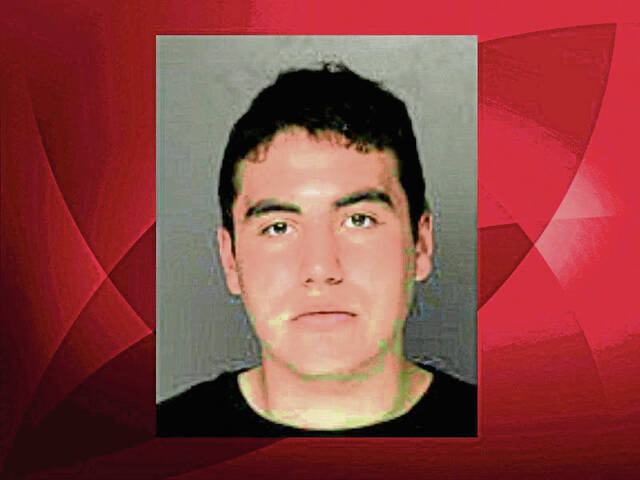Adam Rosenberg said he was compelled to kill by Satan and had designs of becoming a serial killer.
He had already shot two people to death and intended to kill more, he told a forensic psychiatrist.
“Why didn’t he become a serial killer?” asked defense attorney Casey White.
“I believe because he got caught,” answered Dr. Sara West.
On Wednesday, Rosenberg, 23, appeared before Allegheny County Common Pleas Judge Bruce Beemer to enter a plea of guilty but mentally ill to two counts of first-degree murder and related charges.
The charges stem from the Dec. 21, 2019, slaying of Christian Moore-Rouse and the Feb, 15, 2020, killing of Jeremy Dentel, 28.
In exchange for the plea, the district attorney’s office said it would offer Rosenberg two terms of life in prison without parole that would run concurrently.
Judge Beemer, who heard testimony on Rosenberg’s mental illness Wednesday afternoon, has not yet determined whether he will accept the plea. He will announce his decision, and hold a sentencing hearing if the plea is accepted, on May 9.
A complicating factor is that Moore-Rouse’s mother, T. Lee Rouse, objects to the plea offer.
T. Lee Rouse, whose son, Christian Moore-Rouse, was shot and killed on Dec. 21, 2019, objects to the plea offer made to Adam Rosenberg, who also admitted to killing Jeremy Dentel on Feb. 15, 2020. It would allow Rosenberg to serve two life prison terms at the same time. pic.twitter.com/bvBT5zMbuZ
— Paula Reed Ward (@PaulaReedWard) April 20, 2022
She believes that Rosenberg’s life sentences should run consecutively to one another in the event he could someday earn clemency on one of them.
“If he wants to take responsibility, he should take consecutive terms,” said Mark Homyak, the civil attorney representing Rouse in a wrongful death suit against Rosenberg.
Beemer’s courtroom was packed with loved ones from Dentel’s family anticipating the possible plea hearing Wednesday afternoon.
However, only Rouse was there from her family. She told the judge that she was not told that a plea was going to be entered on Wednesday, and instead expected only a motions hearing. Had she known, Rouse said she would have had additional family members present.
She criticized Assistant District Attorney Alex Cashman, the prosecutor on the case, for failing to keep her informed.
“This is so unfair to my son,” she said. “Why wouldn’t he tell Christian’s mother there was going to be this hearing here today?”
Beemer told Rouse that he would delay sentencing to a later date to ensure her family members could attend.
“Everyone has the right to be present,” he said.
Mike Manko, a spokesman for the DA’s office, said that Rouse was told earlier this week that Rosenberg could enter a plea on Wednesday once the judge considered the evidence on mental illness.
“District Attorney (Stephen A.) Zappala (Jr.) has always believed that the most important voice in the room is the voice of the victim and the victim’s extended family,” Manko said in a statement. “This is a mom who will always grieve the loss of her son and DA Zappala respects that.”
During the hearing, Cashman described for the court the extensive amount of evidence investigators collected against Rosenberg, including phone records, Uber and Lyft records, fingerprints, gunshot residue and camera footage.
Law enforcement said that Rosenberg shot Moore-Rouse, 21, of Verona, in the head at Rosenberg’s Fox Chapel home on Dec. 21, 2019, and then hid his body a few feet off the road. It wasn’t discovered until March 3, 2020.
Rosenberg, who had been talking to Dentel through a dating app for two days, went to Dentel’s home on Vernon Avenue in Baldwin around 6 p.m. on Feb. 15, 2020.
A neighbor’s camera showed headlights pull up to the house and a person enter and then leave 53 seconds later.
Cashman said that Rosenberg shot Dentel in the head with a 9 mm handgun. His parents found him the next day, Cashman said.
As part of the investigation, detectives also found Google searches on Rosenberg’s phone including, “police track tinder” and “murder on Vernon Avenue.”
But the bulk of Wednesday’s hearing revolved around testimony from West, the psychiatrist, who told the court that Rosenberg was mentally ill at the time of the crimes.
She said she interviewed Rosenberg for two hours and 45 minutes on Aug. 6 and also reviewed his inpatient hospitalization records from Western Psychiatric Institute and Clinic.
He was hospitalized four times in 2019 after experiencing psychotic symptoms at the airport, West said. Those symptoms included being overly friendly, touching people, not respecting personal boundaries and acting in an odd, disorganized fashion, she said.
Rosenberg has previously been diagnosed with schizoaffective disorder and bi-polar disorder. West diagnosed him with major neurocognitive disorder and unspecified psychosis. She also said he had a marijuana use disorder.
West testified that Rosenberg did not report audio or visual hallucinations but that he “felt compelled to do things based on very fixed things in his head” that she believed were psychotic in nature.
They were “god’s commands,” West said, “what god expected him to do.”
“Did he have urges to kill?” White asked.
“He did,” she answered. “Some people he acted upon. He was able, on occasion, to resist. On other occasions, he was not.”
Rosenberg told West that the more he kills, the closer he feels to god.
“He defined his god as Satan,” West said. “He believed his god made him evil.”
Rosenberg told West that he resisted commands to kill on three occasions — involving an old man; his parents and a person named “Jimmy.”
Rosenberg also told West that he killed Dentel to make amends for failing to kill Jimmy.
“He owed it to his god to make up for the one he didn’t do,” West said.
On cross-examination, Cashman asked West if the first time Rosenberg mentioned being compelled by god to kill was in his interview with her last summer.
“It appears that way, yes,” she answered.
In Pennsylvania, to be found guilty but mentally ill, a defendant must show by a preponderance of the evidence that they either lack the capacity to appreciate the wrongfulness of their conduct or be unable to conform that conduct to the requirements of law.
“He absolutely understood, knew and could interpret the wrongfulness of his actions,” West said. But Rosenberg could not conform his conduct to the law, she continued.
Under state law, a guilty but mentally ill plea does not allow a defendant to be held in a locked psychiatric facility. Instead, they serve their sentence in a prison within the Pennsylvania Department of Corrections. Such a plea does require that the person receive a treatment plan in prison.








